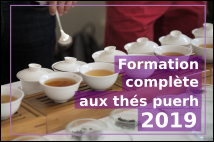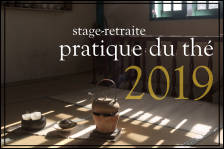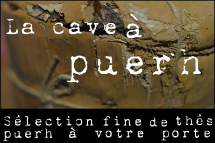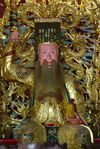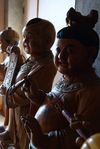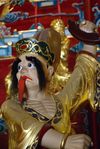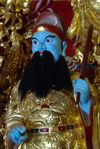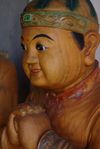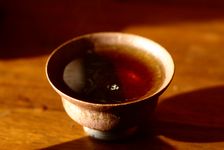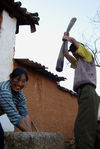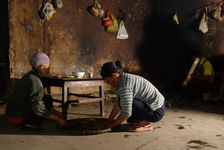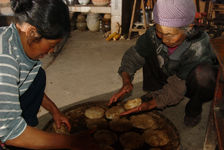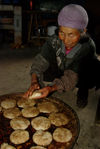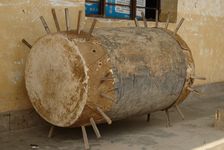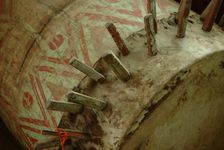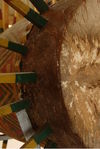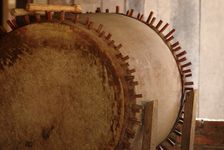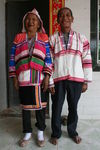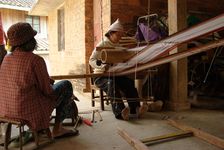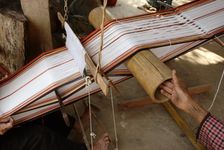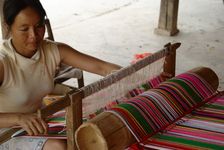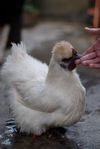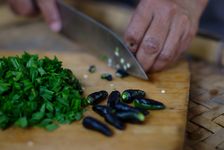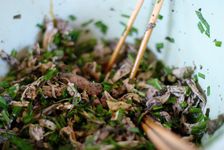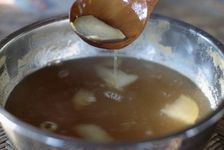 This page is not a real translation but just an automatic translation generated by computer of the original article, written in French language! Its not good... but better than nothing!
This page is not a real translation but just an automatic translation generated by computer of the original article, written in French language! Its not good... but better than nothing!Want to help us do diffuse puerh tea culture in english, by providing a better (or corrected) translation?
Please contact us!

The Chinese calendar is not based on the solar cycle, as is the Gregorian calendar, but the cycle of the moon is so every year between January 21 and February 20 of the Gregorian calendar, the first day of spring in the lunar calendar, as we begin the new year in China.
But much more than a mere formality, or a night of festivities symbolic as we usually practice in the West December 31, the "transition year" also known Nongli Xinnian (农历新年) is for a great majority of the Chinese biggest event of the year and expected that somehow condenses in a week what we know in the West through family celebrations of Christmas, New Year, and large summer vacation ...
Before I invite you at the heart of the festival, and take you into the mountains of Yunnan circles backfires, the fireworks, the profusion of local dishes and white spirit, I would like to take a long time in back to the era of Emperor Shen Nong and early alchemists, originally one of the main ritual of passage this year.
Shen Nong From to Tsao Wang, the King of the hearth
Well-known tea lovers, this is indeed the Emperor Shen Nong, who lived between 2737 and 2697 BC, which legend attributes the discovery of tea, but also the foundations of Chinese medicine (see The origins of tea ).
During his reign the Emperor Shen Nong Chang k'oei designated as a fire officer in charge. At his death becomes a k'oei Chiang Shen , a kind deity is usually translated into French by genius or god. Thus Chiang k'oei become after his death Tsao Shen, the genius of the hearth and stove.
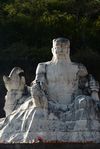

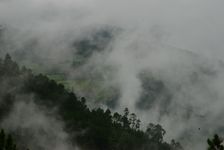


- 1.Sculpture Shen Nong Da Xue Shan, Lincang
- 2.Ritual in the Shen Nong time, Mengku, Lincang
- 3.Mountains of Sichuan in the mist
- 4.Kettle on fire
- 5.Fire of atre
For thousands of years chenn Tsao, the genius of the hearth, the mission to protect them home with four accomplices, engineering windows (Shen Hou), engineering galleries (Shen Hing), the genius of the atrium (Liu Chong Shen) and finally the genius of the door (Menn Shen) which is fixed today effigy on doors to protect traditional entry.

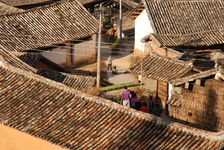
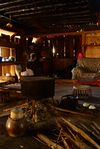
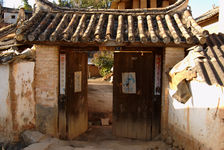
- 1.isolated village in Sichuan
- 2.Traditional Village in Yunnan Lincang
- 3.Foyer in the heart of a traditional Wa Lincang, Yunnan
- 4.Portal protected by the effigy of Shen Menn in a village in Lincang, Yunnan
But it was not until much later that Tsao Shen, becomes more than just a genius of the house, to occupy a central place in the rites of passage of the year.
How the simple genius of the hearth becomes the mighty king of home
We are 140 years before Christ, when the young Wu Di ascended the throne and became the sixth emperor of the Han dynasty. A decade later he made a meeting to mark permanently her life, that of Li Shaojun. Li Shaojun was probably one of the most famous Daoist alchemists and is credited in large part to the introduction of mysticism in the popular Daoist thinking.
Like all alchemist, Li Shaojun practice the transmutation of metals, melting and assemble the material into the stove alchemist, alchemy at this time was even called Tz'u tsao, meaning "sacrifice in the kitchen ". The aim of such practices is the recall not only be able to transform base metals into noble metals such as gold, but also and especially to acquire the same divine powers to include access to the immortality.
And this is where Li Shaojun was not a simple mortal alchemist in search of immortality, but have gotten to the ultimate goal of becoming a Daoist Xian , a kind of immortal sage. Nobody knows where Li Shaojun come or when it was born. In his words he would have stopped it there's aging very long ago at the age of 70 years and having acquired the power to command the spiritual beings would no longer been subject to the effects of age.
At various times Li Shaojun had demonstrated his tenure, including describing accurately the facts of another time when he had attended. Faced with the possibility that he was to command the spirits and gods, many covering Li Shaojun presents, food and clothing and said he never missed gold.
Intrigued Emperor Wu Di Li Shaojun and brought to judge his powers he bring an antique bronze vase which he asked the sage provenance. Without hesitation Li Shaojun vase authenticated as having been placed Pe Qin by the Marquis de Hoann in the tenth year of his reign, more than 500 years ago. After research conducted by the court, it turned out that it was true that impressed the emperor and the court, which agreed to say that Li Shaojun must be aged for several centuries and gave him a place of honor the palace.
Li Shaojun then advised the Emperor to sacrifice the furnace, ie to practice alchemy, and promised him that he could thus access the transmutation of metals, transform cinnabar into gold, and to know the term immortality, that the Emperor began by starting work transmutation. Li Shaojun but soon fell ill and to the astonishment of all died. The Emperor does not believe in his death, he was thinking of changing shape and did seek in vain for years.
Then it was the turn of the concubine of the emperor, to whom he was a love without limits, turn off that Wu Di plunged into deep dejection. It is at this time that the Emperor met Chao Wong, a magician from the Kingdom of Ch'i who claimed to possess the power to communicate with the beyond.
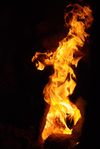
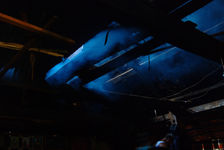

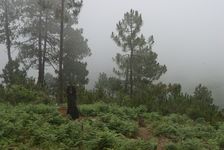
- 1. Fire in the middle of the night, Lincang, Yunnan
- 2. House sorcerer, Bulang Shan, Xishuangbanna
- 3. Potion wood fire, Lincang, Yunnan
- 4. Appearance in the mist Sichuan
And on several occasions the magician conjured before the eyes of Wu Di minds of beings of the past, including his beloved concubine late that did not fail to impress the emperor. Last night that in the presence of the magician spoke alchemy and Tsao Shen, the genius of the furnace, this spirit appeared before their eyes. Terrified Emperor introduce the worship field in honor of the god of the hearth and stove.
If the magician's tricks were later discoveries, which earned him life, the cult of Tsao Shen genius of the hearth, established by Emperor Wu Di for its part will continue for thousands of years and gradually took one central place in the celebration of the passage of years.
Furnace of the alchemist is gradually shifted to the hearth, and Tsao Wang, the King of the hearth, is the faithful companion of the home. And his effigy is hung above the hearth of the home, where he oversees the fire and cooking food.
Big Wang Tsao is watching you!
However, the role of Wang Tsao goes beyond monitoring the kitchen. At the heart of the house, with his portrait hanging over the fireplace, Tsao Wang as Big Brother many years later sees everything, knows everything, hears everything that happens in the home, even the smallest of whispers.
Mandated by the Almighty Yu Hoang, the Jade Emperor of Heaven or master, Wang Tsao has a mission to witness the actions and events that will be held in the house. Thus Wang Tsao was always both loved and respected, but feared by all. We pray, we flatter avoids burning in the fireplace bones, feathers or debris that might offend Tsao Wang.
At the end of each month Tsao Wang will be a summary report to the Jade Emperor of what it will be spent. Emergency or serious misconduct, it may prevent the genius of a city waiting chenn inspector ascends to heaven to prevent the celestial emperor. When a household member dies, Wang Tsao who wrote on the forehead of the deceased that the deceased has done during his life, and it is this inscription to be taken into account by the general court which will decide his fate after death.
But it is at the end of each year, during the passage of the years, as Wang Tsao makes its final report on the year that just happened and home life.
Shen and Song Tsie Shen, Wang Tsao change and passage of the year
Wang Tsao, the god of the hearth is indeed mandated by the grand master of the sky for a year in order to demonstrate the activity of the inhabitants of the home. Last year he returns to the Jade Emperor to his report.
It is the 23rd day of the twelfth lunar month the mandate of Wang Tsao ends, and the ritual of passage of the year begins. Sometimes called French Small New Year this ritual called Song Shen is to extend Wang Tsao to heaven.
We begin by cleaning it for the house in detail, with particular attention to the home, if necessary renew the furniture, everything must be clean to properly accompany the departure of Wang Tsao.
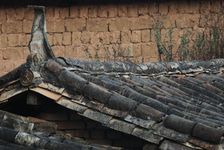
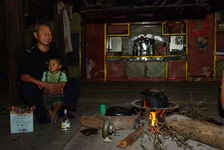
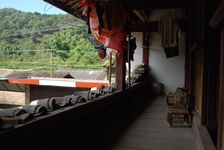
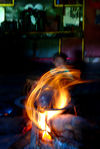
- 1. Traditional house in Lincang, Yunnan
- 2. Interior of a house Bulang, Xishuangbanna, Yunnan
- 3. Gallery of a traditional house in Yi Wu, Xishuangbanna
- 4. Foyer in the heart of home
This is a traditional ritual that takes place in the framework of strict inhabitant of the house. The beautiful girls who are in their family of origin for the new year and should join their husband's family, where they live, and can not attend the ritual in their family of origin.
At the end of the day we loose the image of Tsao Wang sits above the fireplace and placed on a table where some offerings were prepared for sacrifice. Sweets first to pledge his grace and to dissuade say bitter words when he will report to the god of the sky. He also offers some commonly straw, grain, and water for his horse, the road to heaven is very long ... Then burn paper gold bullion, so it lacks nothing in its path, and 5 fighting incense. Then the head of the family lights the portrait of Wang Tsao that he ascended to heaven.
During this time all members of the family, prostrate, pray Tsao Wang, implore not to report bad things about the actions of the family, apologize for all the wrong actions performed, yet the excuse is have smoked for a year, not to see him made room for all the good he has done simmering food ...
Wang Tsao then abandon the home, will fly into the air to accomplish the mission entrusted to it by the Jade Emperor. A week later, on the night of the last day of the twelfth moon, a new genius of the hearth will be commissioned by the Almighty to join the family and take over from the previous marking the beginning of the new year!
That night, dedicated to the god receipt of the home is traditionally a night vigil, where the whole family await the arrival of the new engineering.
And we show a new image of Wang Tsao above the hearth, burning incense sticks while that each member of the family come to worship before this portrait. To accommodate engineering as it should, the head of the family burn an envelope containing compliments and tributes to the attention of Wang Tsao. In the morning we offer him a meal while apologizing for not receiving the best, and we request that you monitor cooking now. The new year can begin!
A new year in Yunnan
Although times have changed though, that over the household's annual New Year's spent most of the 60s cultural household and many rituals and traditions have disappeared, the passage of years throughout China remains a highlight which leaves room for the ritual and symbolism, whether in major cities but also and perhaps especially in remote rural areas such as Yunnan.
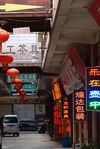
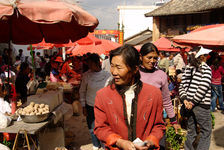
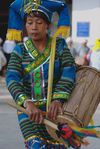
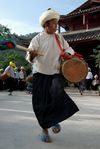
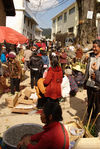
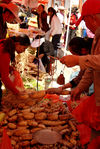
- 1.Lanterns in the aisles of the market in Kunming tea
- 2. Market before New Year in a village in Lincang
- 3. Dance party Bulang
- 5. Market before the new year in the region of Lincang
So if one does not cross can be much more Tsao Wang in homes, it may be even less remains of Mao's portrait on the wall stays the passage of the year is still celebrated as it should and hearts village life, at least in terms of Han villages, and ethnic festivals that their new year during the same period.
Faced with the size of Yunnan, but also the great diversity of culture of this region, the new year can take many forms and turns well in different regions, ethnic groups, and often even from one village to another, although there are still often a number of continuities and similarities here are some examples among others. So welcome to celebrate the new year in the countryside Yunnanaise.
A region, but also a country on leave for a week of festivities ...
The new year is only the first period of annual vacation, usually between 5 and 15 days, the vast majority of Chinese, and so this is a highly anticipated time of all. But it is also often, especially considering the extent of China and the rural exodus, the only time families gather, and many Chinese do not hesitate to cross their region, and sometimes the country world, to find their town or village.
Given the vastness of this country, and the number of people he has (more than three hundred miles Billion) I let you imagine the complexity and the relative chaos that is every year, if that the immense human flow focused on these days (look for the summer holidays paralysis annual road networks self-French, country of fifty million only, taking into account that these leaves are usually spread over two months, gives a rough idea of the problem once scaled Chinese and concentrated over a week!).
The entire infrastructure of the country each year is adapted to contain this massive global movement, trains and planes are booked months in advance and purchase tickets often requires hours in line, especially in large cities where they settled sometimes several months in advance of special offices for the sale of train tickets, postal networks are completely overwhelmed them when many companies are saturated and are no longer able to offer their services. .. posing annually across China a climate of preliminary passage of the year ...
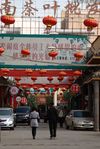
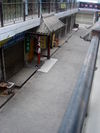
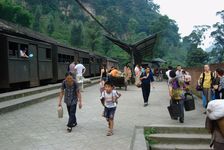
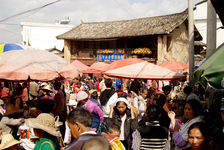
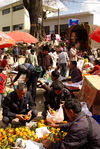
- 1. Tea Market in Kunming desert during New Year
- 3. Steam train in a mountain village in Sichuan
- 4. Market in Lincang campaign during New Year
But it is also, at the New Year's Eve, closed for at least a week, a large majority (almost all in some cities) of shops, stores, industries, restaurants, etc ... We observe, in particular a kind of Yunnan particularly interesting inversion between urban and rural. While in rural areas this week New Year rings of a lifetime and an unusual activity, the villages are filled with children and young people come to meet old cities such as Kunming take the appearance of ghost towns. Deserted streets are no longer a succession of iron curtains closed and it is unrealistic for a big week hope to find in a grocery store where his street to shop, or a restaurant to eat a massage parlor open.
And more than just a vacation, which would somehow wrap Eve, this is all that the new year is spread over a big week (and more in some campaigns), which is every day festivity.
Clean the past and the future treat ...
Chinese New Year is primarily a passage. We just do not celebrate the arrival of the new year, we go from the previous to the next and many of the practices and customs of the new year is precisely to allow this passage under the best conditions. We begin for it and before the first day of spring, by erasing the bad influences of the year just past, starting with cleaning the house from top to bottom, but if necessary the replacement of furniture the replacement of curtains, etc ...
This is also the time when many of its houses restored, rebuilt or enlarged: it bodes well that it ends before the new year, but it also corresponds to the end of the quiet season of Agriculture, time or rebuild the villages before spring crops. Beyond the physical aspect, we also try to settle before the new year all the things that should have been paid during the year, including repay its debts.
Then prepared for the new year it is a new start and runs for the better. In many villages the new year is traditionally the time to buy new clothes and the market for it is full. Can still be seen and in some villages the children run through the streets on New Year's Day to show their new clothes.
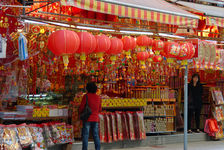
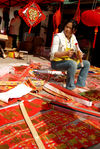
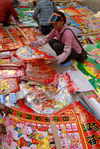
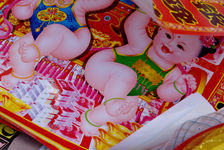
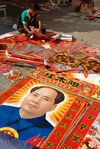
- 1.Shop New Year decorations in Hong Kong
- 2.stalls New Year decorations at a market in Lincang
- 3. Posters to redecorate the house in a market Lincang
- 4. Poster for the new year be under the sign of the Forture
- 5. Mao always quotte among vendors posters for the new year
We also take this opportunity to review the general decoration of his house, markets and villages offering all kinds of paintings, embroidery, posters and poster with the image of Mao, the deity representing prosperity and wealth, children fat or photomontages representing the sumptuous imaginary landscapes. More traditional is displayed on the doors of the house, and the bearing and the gate wings registrations bodes well for the coming year after taking care to remove those last year.
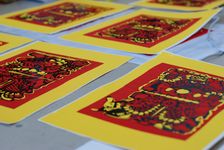
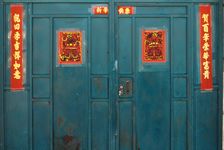
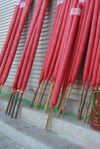
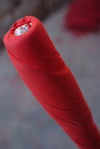
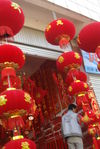
- 1. Posters bearing the image of freshly printed Chen Menn
- 2. Chen Menn and vertical inscriptions on the racks of a door in Lincang
- 3. Big fight incense sold on the street in Yunnan
- 4. End of a big stick of incense for New Year
- 5. Shop New Year decorations in Yunnan
It is also customary to place on both leaf main gate of the house, two posters with the image of Chen Menn, the genius of the door that we mentioned earlier and keep the house and for the year come. A right and left portal then we can turn large incense sticks, human scale, which will all day to eat.
Money, food and backfires in the heart of the party ...
Food and money are from very ancient times two pillars ubiquitous in Chinese culture and daily life. This is especially present during the new year where everything is done for the coming year brings prosperity and fortune. Everything must be large, imposing, expensive or at least seem expensive and many products such as tea are available in very large boxes richly decorated. The most common phrase that is used to wish the new year is well Gongxi facai (恭喜 发财) which means something like "congratulations and make a fortune" ... that children sometimes rhyme rajoutent Hongbao Nalai "For here the hong bao".
The New Year is indeed the time we are offering the Hong bao, red envelopes in which these slips are a few tickets. Traditionally we offer Hong bao children, his own children when they are young children or families that we will visit during the New Year. In this case are generally symbolic envelopes containing small amounts.
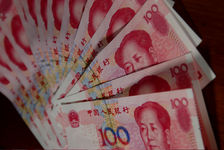
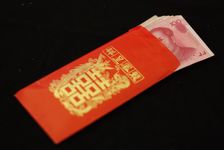
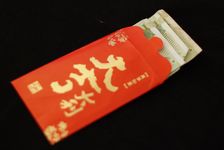
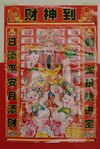
- 1.tickets released brand new distributor
- 2.Big Hong Bao for parents
- 3.Small Hong Bao for children
- 4.Displays new year and plenty of money
But once children become adults and their aging parents, it is customary to give Hong bau more consistent with his parents. In China, where the concept of family is much more important than it is today in the West, where there is no real pension system is traditionally children who have or help their parents when they can no longer work, making it somehow supports they received in their youth. So that the year is that renewal is customary in many areas, not offer in Hong bao as banknotes and distributors of bank typically offer during this period that tickets brand new .
The food is of course also very present, and at the heart of the event. In the countryside is often the time to kill the pig, for families who have the chance to own a pig. Fed throughout the year, the pig is usually killed a few days before the new year which will place a big party where all the friends and neighbors invited to enjoy the sounds freshly killed pig. We then prepare victuals sufficient quantity for the New Year celebration to come, and the rest of the meat is dried to keep until next year ... Even in a town of modest size of the feast day we kill the pig can make astonishing dimensions, and it is not uncommon for a dozen large tables are set up in the course of the farm! In addition, each family chooses a different day to kill the pig, and the festivities can sometimes spread preparations of a family to another on a big week, thus extending further celebration of the new year to come.
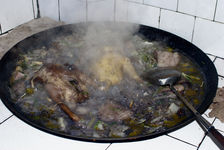
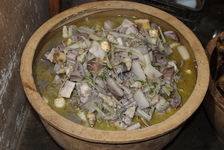
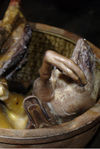
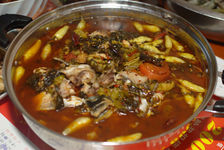
- 1.Preparation of victuals New Year in Yunnan
- 2. Preparation of victuals New Year in Yunnan
- 4. Preparation of the new victuals year in Yunnan
During this week of preliminary country markets are crowded and burdened with food of all kinds: chickens, roosters, fish, pigs, and vegetables galore. It is common for a family, even relatively modest buying chicken (s), and rooster fish, and beef in abundance. Then we cook for a big day, sometimes two, preparing dozens of dishes in astronomical amount, enough to feed a regiment during the entire week of the new year ...
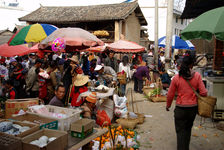
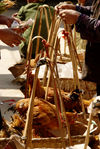
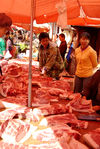
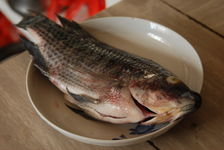
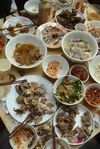
- 1.market in a village in Lincang before the New Year
- 2. Market in a village in Lincang before the New Year
- 4. Fish element inevitable meal New Year
- 5. Table for the New Year
Again everything should be in abundance, and at every meal of the week will be present all types of meat, fish and vegetables, prepared with the utmost care, finesse and refinement in sufficient quantity so that the dishes can not be emptied by the guests. In addition to the refinement of taste, the composition of the food and also largely symbolic. For example fish, also very present in the new year decorations, must be present at every meal, the pronunciation of fish (鱼, yu) is the same as the word surplus (馀, yu), bringing good omen for the coming year is bathed in surplus.
Eve dinner usually happens only in small families, with the inhabitants of the home. The guests are often not tolerated, and even family members living in two separate homes in the same village do not spend time together. It is generally the same the next day, see the next two days as villages, where traditionally we keep the gate of the house closed. After this first phase of intimate family and friends begin to visit, and for several days, sometimes a week, invited into the homes of each other during lunch and dinner where food and hard liquor abound and can last for hours ...
Again each region, see each village has its own traditions. In the village of Yao Wan for example, I mentioned several times in my articles, it is customary for the new year making of "Baba" special cakes of sticky rice sprinkled with sesame seeds, that is given as an offering to the ancestors, but it also gives family members and friends.
China did not invent fireworks for nothing, everything is bathed backfires, almost constant, and the sky nights of colorful wreaths. Traditionally we light fireworks the night of the new year, and a large band of firecrackers, which hangs at the door the day of the year. But it is not just that and fireworks and firecrackers, which are sold absolutely everywhere, exploding merrily in every corner throughout the new year, smoked out the streets and creating a constant hum.
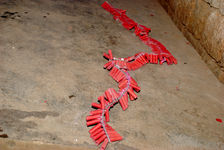
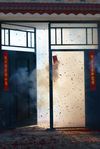
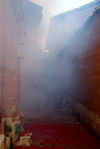
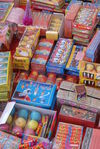
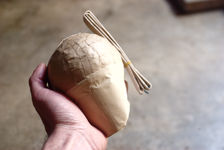
- 1.firecrackers Tapes
- 2. Ribbons of firecrackers in action
- 3. Street smoky by péards
- 4. Stand on a market firecrackers
- 5. Close shot of fireworks
Handmade, these fireworks and firecrackers are a variety of power but also incommensurate with what is freely available in the West, outside the network professional fireworks and sky in some villages mountain like that seen in the West in large-scale events.
This is all the more remarkable in the countryside surrounding Jiang Chuan where all fireworks and firecrackers are made of Yunnan, and found explosives capable of smoke in a few moments a complete street, or fires artifice of the size of a fist, which reach heights sheaves and incredible dimensions. As with everything that comes with the new year, we buy the biggest, and many spend fortunes for those few magical moments that accompany the passage.
A passage of years in Yunnan ethnic
Remember China is a multi-ethnic country. If more than 90% are Han Chinese, there are 55 other ethnic groups in China (according to the grouping of government, the reality is a little more complex). Particularly prevalent in the mountainous region of Yunnan, there are over 25 ethnic groups, the population of these ethnic groups often surpassing han in different parts of Yunnan and in different areas including major productions tea puerh (Pu Er tea) peopled including Dai, Bulang Lahu of Jinuo or Wa.
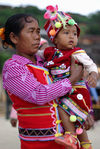
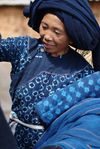
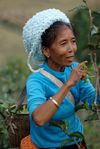
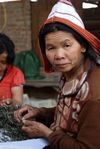
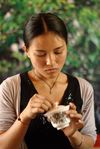
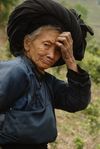
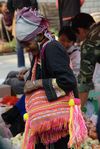
- 1.Wa Woman and child in the region of Lincang
- 2.Female Bulang in the region of Lincang
- 4.Female Jinuo in Xishuangbanna
- 5.Woman Jinuo in Xishuangbanna
- 6.Woman in the Dai region Lincang
- 7.Female Lahu in the region of Lincang
Now the passage of the year as we have to portray, Tsao Wang, Shen Menn and his cronies are typically original Han and things are very different in many villages of Yunnan. Each ethnic group has its own beliefs, in fact, its own rites, are animists or followers of different religions such as Buddhism has often been adapted by ethnicity, and any other way to move from one year to another.
A number of ethnic groups such as Jinuo celebrate their "new year" more or less the same time as the Han, or by influence of the latter, either because their schedule, because their new year begins at the same time. Other ethnic groups that Dai or Bulang instead celebrate their transition from one year to any other period, and of course a very different way, with a few examples here very quickly.
What is called for example the new year Jino, an ethnic group living in Xishuangbanna, which occurs between 6 and February 8 for example has no real meaning for the new year Jinuo. It is initially the largest annual festival in Jinuo named Mao Ke Te by Jino, whose date was not fixed at the origin, and the government of Xishuangbanna in 1988 to set a date close Chinese New Year and a New Year defined as Jinuo.
It is nevertheless the biggest party in Jinuo, which mainly takes place around the sacred drum, intimately related to the origin of Jinuo according to their legend. After a ritual, where they kill especially pork and chicken, begins to reason the sacred drum, the cradle of the nation Jinuo. Day and night they danced and sang around the drum, songs called wuyouke that address particular history Jinuo, mortality and customs, and a special dance call'd Sitongge (hitting the big drum) . Various other rituals take place during these festivities, especially around the village blacksmith to prepare for the harvest to come.
This is also the opportunity to take Jinuo traditional dress. If the little Jinuo still wear traditional costumes daily, of which only the cap and sometimes the bag survived, weaving remained a very important crop among Jinuo and many women continue to build a complete costume each year for each member family, even to do that for the party!
Of course the food and alcohol are again at the center of the party. More than any other minority Jinuo have the effect the reputation of being good living, and see big revelers during festivities alcohol flows actually afloat. The food is also of course abundant, and particularly rich in wild plants and animals that will Jinuo went to pick up for the occasion in the heart of the forest.
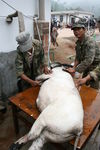
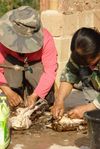
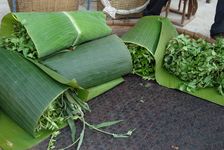
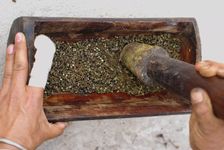
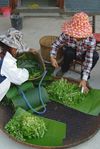
- 1.Preparing the feast in Jinuo (Copyright Stephane Verdeille)
- 2. Preparing the feast in Jinuo
- 5.Preparation of the feast in Jinuo
Particularly prone to partying and Jinuo have often been used to celebrate in addition to their annual festival, the Chinese New Year, and as often as to establish a bridge between the two events creating a large period of festivities before attacking the spring and work in the fields.
Dai and in a manner substantially different from Bulang, celebrate them when their "new year" to any other period of the year during the third lunar month. This celebration is called commonly the water festival has a history of over 700 years.
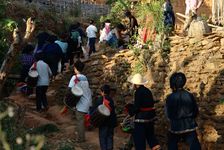
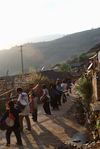
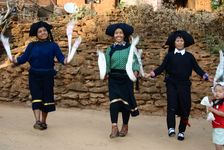
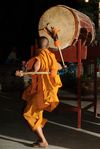
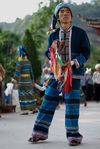
- 1. Procession during the celebration in a village Bulang Lincang
- 3. Dance Bulang in a village in Lincang
- 4. Monk beating drum in a temple Bulang
- 5. Music in the celebration in a village Bulang Lincang
Initially this ritual is a religious ceremony of Indian Brahmanism. Absorbed by Buddhism with him she comes in Yunnan through Burma, and today marks the biggest celebration of ethnic groups such as Dai Buddhist, or Bulang influenced by the former.
Water symbolizes for Dai and Bulang beauty and radiance, vitality that allows plants to grow and life to exist and is the center of the party. The festivities last for three days. We begin as in the Han by killing pig or beef, clean the house and prepare food for the feast to come. This is the second day that we will put these seniors, and large dinner prepared by family and friends.
Different traditions take place according to the villages during the festival, children produce water gun with bamboo, villagers of all ages come to the mountain to look for wild flowers and decorate the house.
But this is the third day that the water takes the place of the event center. The ritual begins the morning after VETIS his best clothes, with provide water source to the temple and then bathe the Buddha. Thus, we find some amazing village of stairs seemed to lead nowhere but actually showering Buddha during the water festival.
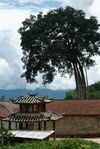
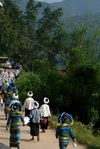
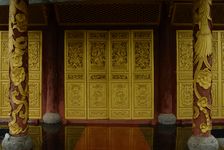
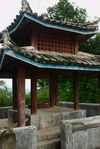
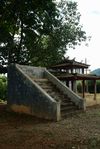
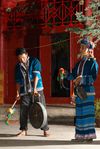
- 1. In a village Bulang
- 2. On the way to the temple in a village Bulang Lincang
- 3. Buddhist Temple in a village Bulang
- 5. stairs to the shower to Buddha in a temple Bulang
- 6. Music in a temple Bulang
Then everyone gradually started to sprinkle water beneficial in order to bring luck and good health. It can begin with a small splash of backhand, but soon they are full bucket of water flying in the air! Indeed, the water brings happiness and we get water, the more you will be happy. Although this ritual is originally Dai, then returned to the heart of culture Bulang, various other ethnic groups, but also Han, areas inhabited by Dai and Bulang such as Xishuangbanna or Lincang, come join Day and sprinkle generously with water!
In the village it is a long-awaited moment where everyone happily sprinkles of water. Particularly popular with children that quickly becomes a battle of large-scale water, or in the streets the children totally soaked to pursue bucket of water in hand in the shouts and laughter!
In larger villages or towns it takes unimaginable proportions that attracts neighboring villagers. All shots are then allowed water flows and truly afloat! Large water tanks take place here and there, in order to re-replir his bucket of water when you need it, anywhere hordes of young and less young people roam the streets armed with water pistol or more simply seal water do not stay full.
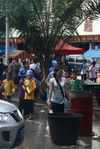
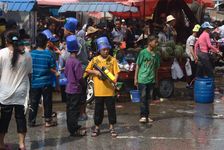
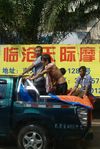
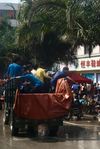

- 1. Feast of the water Shuangjiang, Lincang
- 4. Fete water to Shuangjiang, Lincang
- 5. Feast of the water Shuangjiang, Lincang
But more truckloads of water improvise here and there through the streets, filled with army troops motivated and bucket, snipe around big shot bucket of water ... There really is no limit as long as you properly watered the world's largest, and it will hardly be surprised to see a street corner in a big tanker sprinkle of happiness across the street shot fire hose!

